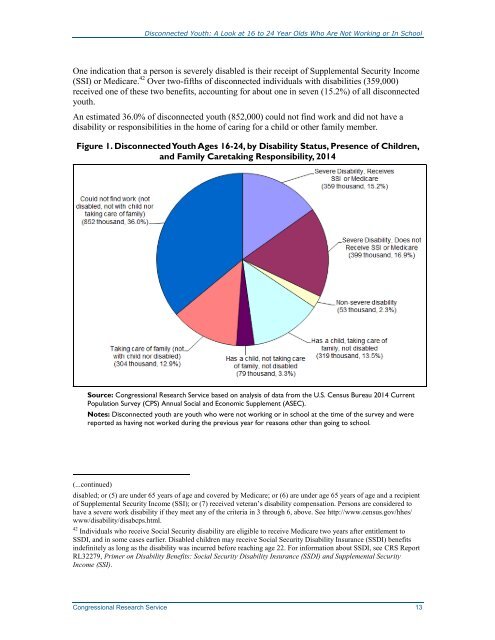Opportunity Youth: Disenfranchised Young People
Opportunity Youth: Disenfranchised Young People
Opportunity Youth: Disenfranchised Young People
You also want an ePaper? Increase the reach of your titles
YUMPU automatically turns print PDFs into web optimized ePapers that Google loves.
Disconnected <strong>Youth</strong>: A Look at 16 to 24 Year Olds Who Are Not Working or In School<br />
One indication that a person is severely disabled is their receipt of Supplemental Security Income<br />
(SSI) or Medicare. 42 Over two-fifths of disconnected individuals with disabilities (359,000)<br />
received one of these two benefits, accounting for about one in seven (15.2%) of all disconnected<br />
youth.<br />
An estimated 36.0% of disconnected youth (852,000) could not find work and did not have a<br />
disability or responsibilities in the home of caring for a child or other family member.<br />
Figure 1. Disconnected <strong>Youth</strong> Ages 16-24, by Disability Status, Presence of Children,<br />
and Family Caretaking Responsibility, 2014<br />
Source: Congressional Research Service based on analysis of data from the U.S. Census Bureau 2014 Current<br />
Population Survey (CPS) Annual Social and Economic Supplement (ASEC).<br />
Notes: Disconnected youth are youth who were not working or in school at the time of the survey and were<br />
reported as having not worked during the previous year for reasons other than going to school.<br />
(...continued)<br />
disabled; or (5) are under 65 years of age and covered by Medicare; or (6) are under age 65 years of age and a recipient<br />
of Supplemental Security Income (SSI); or (7) received veteran’s disability compensation. Persons are considered to<br />
have a severe work disability if they meet any of the criteria in 3 through 6, above. See http://www.census.gov/hhes/<br />
www/disability/disabcps.html.<br />
42 Individuals who receive Social Security disability are eligible to receive Medicare two years after entitlement to<br />
SSDI, and in some cases earlier. Disabled children may receive Social Security Disability Insurance (SSDI) benefits<br />
indefinitely as long as the disability was incurred before reaching age 22. For information about SSDI, see CRS Report<br />
RL32279, Primer on Disability Benefits: Social Security Disability Insurance (SSDI) and Supplemental Security<br />
Income (SSI).<br />
Congressional Research Service 13

















